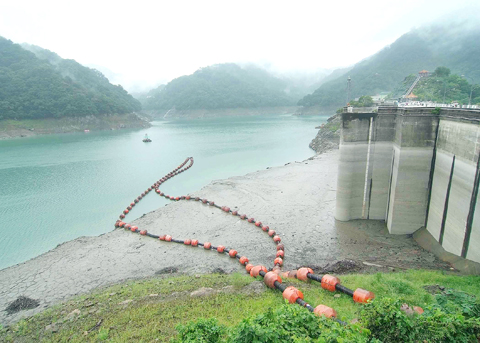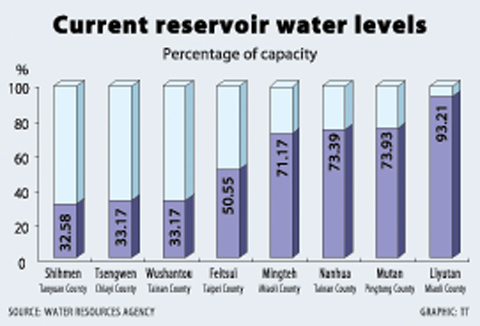Premier Liu Chao-shiuan (劉兆玄) yesterday urged the public to conserve water in the face of a looming water shortage.
“Taiwan will become a country where water shortage is a serious problem in the near future if we fail to address the situation of average water consumption per person per day, which is higher than the world average,” Liu said as he inspected Shihmen Reservoir (石門水庫) in Taoyuan County.
Liu made the remarks after being briefed on the water supply situation by Water Resources Agency (WRA) Director-General Chen Shen-hsien (陳伸賢).

PHOTO: CNA
Chen said that average water consumption per person per day dropped to 274 liters last year, from a high of 290 in 2001, but he hoped the amount could be cut to 200 as in most European countries.
Studies showed that 27 percent of household water was used to flush toilets, 21 percent was used to do laundry, 20 percent was used for showers, 15 percent was used in cooking, drinking and cleaning, and 17 percent for other purposes, Chen said.
“The water shortage facing the country is an opportunity for people to adjust their habits to minimize water consumption,” the premier said.

In related news, WRA Deputy Director Wu Yueh-si (吳約西) said on Monday that the lower than expected rainfall this year has prompted fears of water shortages because Shihmen Reservoir was only 32 percent full and the Tsengwen Reservoir (曾文水庫) in Tainan County was around 30 percent full.
Only the water levels in reservoirs supplying central Taiwan are normal, the Ministry of Economic Affairs said.
The Taiwan Water Corp (TWA) yesterday began reducing water pressure at night in Keelung, Tainan County, Tainan City and Penghu County to control the volume of water dispensed.
Wu said that the supply of industrial and household water from Shihmen Reservoir would be capped at 90 percent and 70 percent respectively compared with normal levels.
The reduction in agricultural water supplies would not affect production, he said.
Meanwhile, Vice Minister of Economic Affairs Hwang Jung-chiou (黃重球) said yesterday that in the worst-hit areas, water supplies for swimming pools and spas, the cleaning of high-rise buildings and car washes might have to be reduced or halted altogether.
Officials will meet on Tuesday to discuss water-rationing measures, Hwang said.
“We’re urging the public to conserve water,” Hwang said.
Taipei recorded 140.9mm of rainfall last month, 43 percent less than the average for the month between 1971 and 2000, the Central Weather Bureau’s Web site showed.
Meanwhile, officials in charge of Taipei’s Feitsui Reservoir said its supplies were normal and water rationing would not be imposed anytime soon.
Reservoir administration direction Lee Kung-che (李公哲) said the water level of the reservoir was 149.03m, 11.03m higher than the “shortage level” of 138m.
“Taipei City’s water supply will be stable. We will not have any water rationing measures in the next 61 days,” Lee said at the Taipei City Hall.
The reservoir’s output was 3.2 million tonnes a day, providing water to Taipei City as well as Sanchong (三重), Sindian (新店), Yonghe (永和), Jhonghe (中和), Tamshui (淡水) and Sanjhih (三芝) in Taipei County.
Lee said the reservoir’s water supply was stable for the near future because plenty of rainfall was predicted for northern Taiwan this month and next month.
To ease the burden on Shihmen Reservoir, Lee said that Feitsui would increase its supply to Banxin Water Supply Center from 200,000 tonnes a day to 400,000 tonnes.
Water levels at other major reservoirs around the country have fallen to alarmingly low levels as well, but Shihmen Reservoir has been the hardest hit, with a water level of just 224.3m on Friday evening.
The reservoir’s “shortage level” is 220m.
ADDITIONAL REPORTING BY MO YAN-CHIH AND BLOOMBERG

MORE VISITORS: The Tourism Administration said that it is seeing positive prospects in its efforts to expand the tourism market in North America and Europe Taiwan has been ranked as the cheapest place in the world to travel to this year, based on a list recommended by NerdWallet. The San Francisco-based personal finance company said that Taiwan topped the list of 16 nations it chose for budget travelers because US tourists do not need visas and travelers can easily have a good meal for less than US$10. A bus ride in Taipei costs just under US$0.50, while subway rides start at US$0.60, the firm said, adding that public transportation in Taiwan is easy to navigate. The firm also called Taiwan a “food lover’s paradise,” citing inexpensive breakfast stalls

TRADE: A mandatory declaration of origin for manufactured goods bound for the US is to take effect on May 7 to block China from exploiting Taiwan’s trade channels All products manufactured in Taiwan and exported to the US must include a signed declaration of origin starting on May 7, the Bureau of Foreign Trade announced yesterday. US President Donald Trump on April 2 imposed a 32 percent tariff on imports from Taiwan, but one week later announced a 90-day pause on its implementation. However, a universal 10 percent tariff was immediately applied to most imports from around the world. On April 12, the Trump administration further exempted computers, smartphones and semiconductors from the new tariffs. In response, President William Lai’s (賴清德) administration has introduced a series of countermeasures to support affected

CROSS-STRAIT: The vast majority of Taiwanese support maintaining the ‘status quo,’ while concern is rising about Beijing’s influence operations More than eight out of 10 Taiwanese reject Beijing’s “one country, two systems” framework for cross-strait relations, according to a survey released by the Mainland Affairs Council (MAC) on Thursday. The MAC’s latest quarterly survey found that 84.4 percent of respondents opposed Beijing’s “one country, two systems” formula for handling cross-strait relations — a figure consistent with past polling. Over the past three years, opposition to the framework has remained high, ranging from a low of 83.6 percent in April 2023 to a peak of 89.6 percent in April last year. In the most recent poll, 82.5 percent also rejected China’s

PLUGGING HOLES: The amendments would bring the legislation in line with systems found in other countries such as Japan and the US, Legislator Chen Kuan-ting said Democratic Progressive Party (DPP) Legislator Chen Kuan-ting (陳冠廷) has proposed amending national security legislation amid a spate of espionage cases. Potential gaps in security vetting procedures for personnel with access to sensitive information prompted him to propose the amendments, which would introduce changes to Article 14 of the Classified National Security Information Protection Act (國家機密保護法), Chen said yesterday. The proposal, which aims to enhance interagency vetting procedures and reduce the risk of classified information leaks, would establish a comprehensive security clearance system in Taiwan, he said. The amendment would require character and loyalty checks for civil servants and intelligence personnel prior to